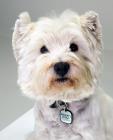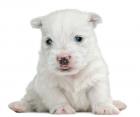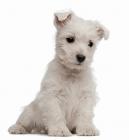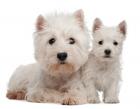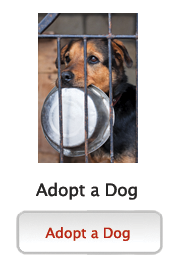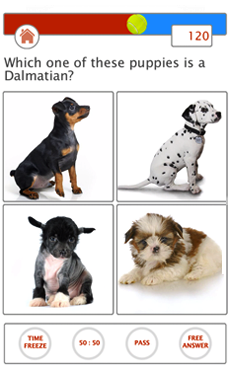West Highland Terrier
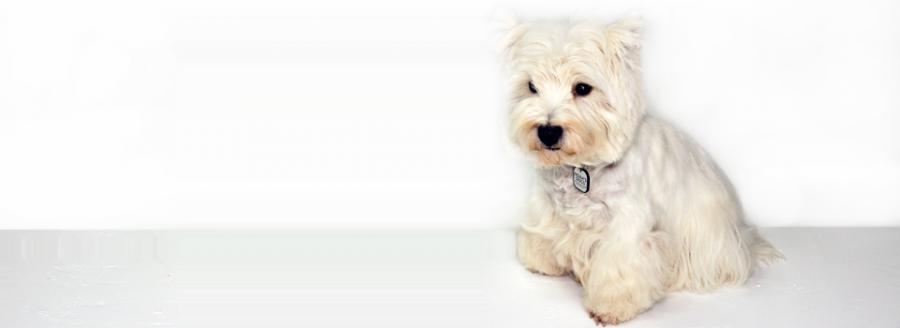
In my own words
Attitude? Me? Never! I just like to keep active. I may look cute and fluffy, but don’t underestimate me- my energy knows no bounds. Strong-willed and tireless, I’m a real little bundle of energy. Don’t fret just yet, I may be energetic but I promise that I’m not too much of a handful. Lucky for you, I don’t require constant walks to keep me fit and healthy. In fact, I can make my own fun and I challenge you to find a more adventurous playmate than me. I’ll run rings around the kids, inside the house and out. As long as they’re not too small that is; I can only handle so much rough and tumble!
You’ll find that I’m naturally curious and intelligent and I’ll be sure to bark when I sight someone suspicious approaching. I come from a long line of hunting dogs, so I may get a bit carried away when I see a small critter scurrying off somewhere. Honestly, it’s probably best to keep me on a leash. Don’t say I didn’t warn you!
My ideal owner(s)
Families with school age children
Active seniors
Singles
City dwellers
What they say about me
Energetic
Playful
Curious
Adventurous
Please read on, to find out more about me, and whether I will be someone you can be happy with for the next 14 years, or even longer!
Is this West Highland Terrier for you?
Test your knowledge about the West Highland Terrier
Information essential about the West Highland Terrier
Kennel Club Group:
Terrier
Size:
Small: Weight Male 15 – 22 lb (7 – 10 kg) Female 15 – 22 lb (7 – 10 kg)
Height: Male 10 – 11” (25 – 28 cm) Female 10 – 11” (25 – 28 cm)
Popularity:
West Highland Terriers have become increasingly popular over the years due to their capabilities as both hunting dogs and companions
Breed History:
Originating in Scotland in the 1800s, legend has it that the modern West Highland Terrier was bred from the offspring of the Cairn Terrier and the Scottish Terrier. After accidentally shooting and killing his favourite dark terrier, Colonel Malcolm of Poltalloch, Argyleshire, vowed to have only white dogs. From that point on, selective breeding was practiced in order to create a hunting terrier that could not be mistaken for foxes or other vermin. It is their prized white coat that ensures that the West Highland Terrier remains highly visible on the Scottish moors. Debuted at a London dog show in 1907 and registered by the AKC in 1908, the breed was originally named as the Roseneath Terrier. This was later changed to the far catchier West Highland Terrier.
A true hunting dog, the "Westie", as it is affectionately known, was bred to be small enough to fit between the rocks and small passageways that are typical of fox dens. Another defining feature is that the tail is traditionally longer and straighter than the majority of small dogs. This is in order to counteract the Westie’s the somewhat regrettable instinct to dive headlong into any fox/rabbit hole in sight. Often getting stuck headfirst, the tail has proven to be a useful means for owners to pull their little companion out to safety.
The West Highland Terrier’s keen intelligence and boundless energy ensures that it is an ideal all-round family pet.
Character:
Your plucky little West Highland Terriers is a loyal and devoted pet, making it a great family dog for both city and country living. Westies are so faithful to their owners that they will often bark at approaching strangers, a trait that can be monitored through careful training. While these effective guard dogs are alert and courageous, they can also prove to be stubborn. It’s best to keep an eye on your self-confident friend to ensure that they don’t get up to any mischief. Your West Highland Terrier shouldn’t be left alone for too long unless you’re prepared to loose your slippers, or worse, to their eager clutches. Despite their cheekier traits, the loyalty of Westies to their family knows no bounds. They get along well with children who are old enough to respect their space and aren’t too rough with them. As well as this they are very friendly with strangers (permitting that they aren’t sneaking into the house unannounced). An affable breed by nature, Westies are also good with other dogs as long as they have been properly socialised as puppies. At times their hunting genes do kick- they have a tendency to chase cats for miles.
Temperament:
Get ready because your West Highland Terriers sure does love attention (and a lot of it at that). While they are generally quite headstrong and independent dogs, they do need sufficient care and activity or they can become restless. You’ll soon find that West Highland Terriers are cheeky, confident and affectionate characters who love to be played with. Always eager for a walk or run, you’ll struggle to keep up with your Westie at the best of times. Despite their diminutive stature, your friendly little companion is also very courageous, so you can sleep safe at night knowing that they are guarding the family home with all of their might. While West Highland Terriers are highly intelligent they can also be rather naughty, so it is integral that you remain consistent in their training.
Conformation:
West Highland Terriers should be compact, well-balanced and hardy looking dogs. Their tough frame is covered in a 2-inch white coat with an outer layer of straight hard hair and a soft under layer. They should possess shaggy eyebrows, a little black nose and small erect ears. All pigmentation should be black, from the lips, eye-rims and pads of the feet to the nails. The head is slightly domed with a distinct stop and the teeth should be large in comparison to the dog’s small size. The West Highland Terrier’s eyes should be set well apart, medium-sized and dark in colour. The muscular neck and sloping shoulder ought to lead to a deep-set chest. The front legs should be short, muscular and straight; the hind legs short, muscular and sinewy. The forefeet should be larger than the hind, round, strong and thickly padded and covered with short harsh hair. The Westie’s distinctive tail should be long and straight with no feathering and carried jauntily. On no account should tails be docked. Overall, shaggy and small West Highland Terriers have a warm and soft look that embodies strength and activity.
Colour:
Always white.
Training:
Westies are people pleasers, so they do generally respond to well training. However they can also be very stubborn, so owners must ensure that they are firm and consistent in their training
Care:
Westies are relatively clean and odourless, but they still need daily brushing to keep their coat under control. When the dogs get dirty it is best to let the mud dry on them and brush it off when dry. They should be groomed once a week to ensure that they are kept clean and free of tangles. However, it should be noted that the beard is a particular trouble spot for matting and may need daily brushing. The coat needs to be hand plucked two or three times a year by a professional groomer.
Health:
The lifespan of a healthy individual is between 12 and 16 years. If you buy from a reputable, responsible breeder, serious health problems should not occur. However, if your Westie does achieve a good old age, the normal complaints that we all suffer from, such as arthritis and failing eyesight may begin to develop. Possible diseases include Globoid Cell Leukodystrophy, Krabbe's and Cranio Mandibular Osteopathy. Hip and elbow dysplasia can also occur. This condition can be alleviated by surgery, at some cost to dog and owner. However, it is a wise preventative measure to get your puppy hip and elbow scored if you are thinking of breeding later on. Other problems can include patella luxation, where the kneecap slips in and out of place, arthritis and cruciate ligament rupture. Some of the more common issues that they can suffer from include joint deterioration and skin allergies. However, Westies are generally hardy little dogs with few breed-specific problems being reported.
You may also like:
West Highland Terriers and their owners »

If you like West Highland Terriers, you may be interested in breeds of the same size »
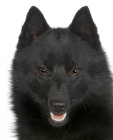


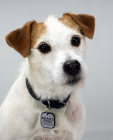

If you like West Highland Terriers, you may like other breeds with similar characteristics »


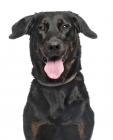

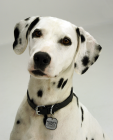
If you like West Highland Terriers, you may be interested in these other terrier dogs »



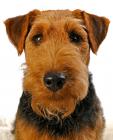
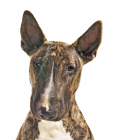
Advice on choosing your breed »
Find an animal shelter or rescue home where a West Highland Terrier is waiting for a new home »
The following grid gives a fast track review which covers all breeds. You can apply it to help you decide if a West Highland Terrier is suitable for you, the environment where you live, your personality and your lifestyle. On the grid, 1= strongly disagree, and 5= strongly agree. For example, if you are looking for a dog that likes to run, look down the list under Activities, and you will see that West Highland Terriers make great jogging companions, scoring 5. If you want a playful companion, look down the same list, and you will see that West Highland Terriers love to fetch and hunt, and score 5. You might like to save or print off this section and keep it for reference while you check some other breeds before making your final choice
Add your own ratings on this breed »
|
*PLEASE NOTE: All our breed profiles are general, and all dogs are individuals. Always talk to the breeders and meet the owners you are buying from. Try to meet the dog and its parents if it is a puppy in their home environment.








